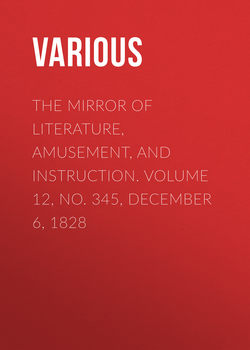Читать книгу The Mirror of Literature, Amusement, and Instruction. Volume 12, No. 345, December 6, 1828 - Various - Страница 3
HISTORY AND ANTIQUITY OF WILLS
Оглавление(For the Mirror.)
According to Blackstone, wills are of high antiquity. We find them among the ancient Hebrews; not to mention what Eusebius and others have related of Noah's testament, made in writing, and witnessed under his seal, by which he disposed of the whole world. A more authentic instance of the early use of testaments occurs in the sacred writings, (Genesis, chap. xlviii.) in which Jacob bequeaths to his son Joseph, a portion of his inheritance, double to that of his brethren.
The Grecian practice concerning wills (says Potter) was not the same in all places; some states permitted men to dispose of their estates, others wholly deprived them of that privilege. We are told by Plutarch, that Solon is much commended for his law concerning wills; for before his time no man was allowed to make any, but all the wealth of deceased persons belonged to their families; but he permitted them to bestow it on whom they pleased, esteeming friendship a stronger tie than kindred, and affection than necessity, and thus put every man's estate in the disposal of the possessor; yet he allowed not all sorts of wills, but required the following conditions in all persons that made them:—
1st. That they must be citizens of Athens, not slaves, or foreigners, for then their estates were confiscated for the public use.
2nd. That they must be men who have arrived to twenty years of age, for women and men under that age were not permitted to dispose by will of more than one medimn of barley.
3rd. That they must not be adopted; for when adopted persons died without issue, the estates they received by adoption returned to the relations of the men who adopted them.
4th. That they should have no male children of their own, for then their estate belonged to these. If they had only daughters, the persons to whom the inheritance was bequeathed were obliged to marry them. Yet men were allowed to appoint heirs to succeed their children, in case these happened to die under twenty years of age.
5th. That they should be in their right minds, because testaments extorted through the phrenzy of a disease, or dotage of old age, were not in reality the wills of the persons that made them.
6th. That they should not be under imprisonment, or other constraint, their consent being then only forced, nor in justice to be reputed voluntary.
7th. That they should not be induced to it by the charms and insinuations of a wife; for (says Plutarch) the wise lawgiver with good reason thought that no difference was to be put between deceit and necessity, flattery and compulsion, since both are equally powerful to persuade a man from reason.
Wills were usually signed before several witnesses, who put seals to them for confirmation, then placed them in the hands of trustees, who were obliged to see them performed. At Athens, some of the magistrates were very often present at the making of wills. Sometimes the archons were also present. Sometimes the testator declared his will before sufficient witnesses, without committing it to writing. Thus Callias, fearing to be cut off by a wicked conspiracy, is said to have made an open declaration of his will before the popular assembly at Athens. There were several copies of wills in Diogenes Laertius, as those of Aristotle, Lycon, and Theophrastus; whence it appears they had a common form, beginning with a wish for life and health.
The most ancient testaments among the Romans were made vivâ voce, the testator declaring his will in the presence of seven witnesses; these they called nuncupative testaments; but the danger of trusting the will of the dead to the memory of the living soon abolished these; and all testaments were ordered to be in writing.
The Romans were wont to set aside testaments, as being inofficiosa, deficient in natural duty, if they disinherited or totally passed by (without assigning a true and sufficient reason) any of the children of the testator. But if the child had any legacy, though ever so small, it was a proof that the testator had not lost his memory nor his reason, which otherwise the law presumed. Hence probably (says Blackstone) has arisen that groundless, vulgar error of the necessity of leaving the heir a shilling, or some other express legacy, in order to effectually disinherit him; whereas the law of England, though the heir, or next of kin, be totally omitted, admits no querela inofficiosa, to set aside such testament.
Alfred the Great made a will, wherein he declared, in express terms, that it was just the English should be as free as their own thoughts.
P.T.W.
